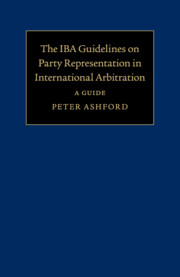Book contents
- Frontmatter
- Contents
- Dedication
- Preface and dedication
- Cases
- About the IBA Arbitration Committee
- The Guidelines
- Definitions
- Guidelines 1–3
- Guidelines 4–6
- Guidelines 7–8
- Guidelines 9–11
- Guidelines 12–17
- Guidelines 18–25
- Guidelines 26–27
- Appendix 1 Extract from the LCIA Arbitration Rules 2014 and Annex to the LCIA Rules
- Appendix 2 Interaction of IBA Rules with major professional conduct rules
- Appendix 3 Interaction of IBA Rules with major institutional rules
- Index
Guidelines 9–11
Published online by Cambridge University Press: 05 July 2016
- Frontmatter
- Contents
- Dedication
- Preface and dedication
- Cases
- About the IBA Arbitration Committee
- The Guidelines
- Definitions
- Guidelines 1–3
- Guidelines 4–6
- Guidelines 7–8
- Guidelines 9–11
- Guidelines 12–17
- Guidelines 18–25
- Guidelines 26–27
- Appendix 1 Extract from the LCIA Arbitration Rules 2014 and Annex to the LCIA Rules
- Appendix 2 Interaction of IBA Rules with major professional conduct rules
- Appendix 3 Interaction of IBA Rules with major institutional rules
- Index
Summary
9. A Party Representative should not make any knowingly false submission of fact to the Arbitral Tribunal.
10. In the event that a Party Representative learns that he or she previously made a false submission of fact to the Arbitral Tribunal, the Party Representative should, subject to countervailing considerations of confidentiality and privilege, promptly correct such submission.
11. A Party Representative should not submit Witness or Expert evidence that he or she knows to be false. If a Witness or Expert intends to present or presents evidence that a Party Representative knows or later discovers to be false, such Party Representative should promptly advise the Party whom he or she represents of the necessity of taking remedial measures and of the consequences of failing to do so. Depending upon the circumstances, and subject to countervailing considerations of confidentiality and privilege, the Party Representative should promptly take remedial measures, which may include one or more of the following:
(a) advise the Witness or Expert to testify truthfully;
(b) take reasonable steps to deter the Witness or Expert from submitting false evidence;
(c) urge the Witness or Expert to correct or withdraw the false evidence;
(d) correct or withdraw the false evidence;
(e) withdraw as Party Representative if the circumstances so warrant.
IBA COMMITTEE COMMENTS
Comments to Guidelines 9–11
Guidelines 9–11 concern the responsibility of a Party Representative when making submissions and tendering evidence to the Arbitral Tribunal. This principle is sometimes referred to as the duty of candour or honesty owed to the Tribunal.
The Guidelines identify two aspects of the responsibility of a Party Representative: the first relates to submissions of fact made by a Party Representative (Guidelines 9 and 10), and the second concerns the evidence given by a Witness or Expert (Guideline 11).
With respect to submissions to the Arbitral Tribunal, these Guidelines contain two limitations to the principles set out for Party Representatives. First, Guidelines 9 and 10 are restricted to false submissions of fact. Secondly, the Party Representative must have actual knowledge of the false nature of the submission, which may be inferred from the circumstances.
Under Guideline 10, a Party Representative should promptly correct any false submissions of fact previously made to the Tribunal, unless prevented from doing so by countervailing considerations of confidentiality and privilege.
- Type
- Chapter
- Information
- The IBA Guidelines on Party Representation in International ArbitrationA Guide, pp. 50 - 57Publisher: Cambridge University PressPrint publication year: 2016

